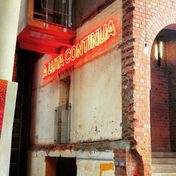Created in 2012, Theorizing the Contemporary seeks to extend the horizon of social analysis in new directions, including challenges to what constitutes "theory" in the first place. Theorizing the Contemporary series are reviewed by the editors of Cultural Anthropology; series editors must be current members of the SCA.

An Otherwise Anthropology
In recent years, the concept of the otherwise has been tracking across anthropology to frame political potentialities that are emerging, often drawing on phenom... More

An Anthropogenic Table of Elements
In the 150 years since its construction by the Russian chemist Dmitry Mendeleev, the periodic table of chemical elements has become both a ubiquitous and iconic... More

Embodied Ecologies
The materiality of human bodies at the smallest scales—genes, microbes, chemicals, hormones—is increasingly being understood as both responsive to broader envir... More

Temporary Possession
Around the world, experiences of ownership are turning toward temporary and contingent forms of possession. This Theorizing the Contemporary series explores tem... More

Speculative Anthropologies
At the intersection of speculative fiction and anthropology, we find a sense of epistemological humility about the kind of worlds we could or should inhabit. ... More

Time of Monsters
In her contribution to the 2016 Hot Spots series on liberalism’s contemporary crisis, Andrea Muehlebach aptly and beautifully rendered our current political s... More

The Naturalization of Work
The naturalization of work usually refers to social processes that make a life underpinned by labor seem unquestionable, inevitable, and even desirable. This ki... More

Speaking Volumes
Having engaged with the recent volumetric turn in architecture and political geography, anthropologists are increasingly concerned with realms such as air, oc... More

Keywords for Ethnography and Design
This series of short essays explores issues facing ethnographers working on or in collaboration with design as a field. It begins from the proposition that the ... More

Our Lives with Electric Things
Our lives with electric things are positively charged with meaning. Our bodies pulse with electrical activity. The electric appliances, devices, and technologie... More